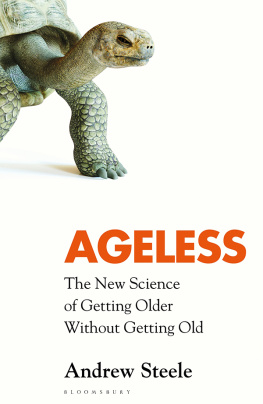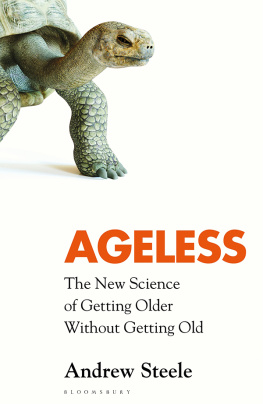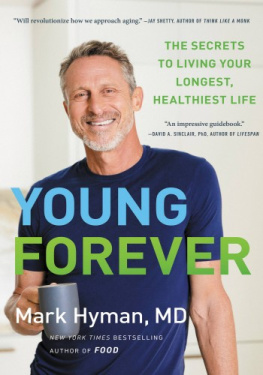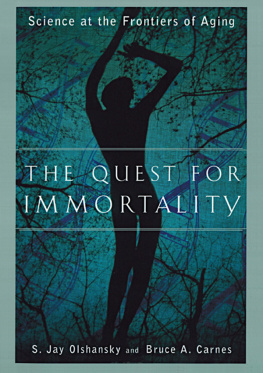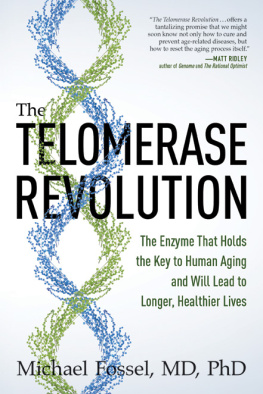
AGELESS

BLOOMSBURY PUBLISHING
Bloomsbury Publishing Plc
50 Bedford Square, London, WC1B 3DP, UK
BLOOMSBURY, BLOOMSBURY PUBLISHING and the Diana logo are trademarks of Bloomsbury Publishing Plc
First published in Great Britain 2020
Copyright Andrew Steele, 2020
Andrew Steele has asserted his right under the Copyright, Designs and Patents Act, 1988, to be identified as Author of this work
All rights reserved. No part of this publication may be reproduced or transmitted in any form or by any means, electronic or mechanical, including photocopying, recording, or any information storage or retrieval system, without prior permission in writing from the publishers
Bloomsbury Publishing Plc does not have any control over, or responsibility for, any third-party websites referred to in this book. All internet addresses given in this book were correct at the time of going to press. The author and publisher regret any inconvenience caused if addresses have changed or sites have ceased to exist, but can accept no responsibility for any such changes
A catalogue record for this book is available from the British Library
ISBN: HB: 978-1-5266-0826-0; TPB: 978-1-5266-0829-1; eBook: 978-1-5266-0827-7
To find out more about our authors and books visit www.bloomsbury.com and sign up for our newsletters
Contents
Wrinkled, toothless and ambling with a ponderous gait, it seems unlikely at first glance that the giant Galpagos tortoise could teach us anything about ageing gracefully. They are eponymous inhabitants of the remote Galpagos Islands, a volcanic archipelago in the Pacific which draws its name from the old Spanish word galpago , meaning tortoise. These cumbersome reptiles can weigh over 400 kilograms, and take decades to reach maturity on a diet of leaves and lichens.
The Galpagos Islands were made famous after Charles Darwin visited in 1835, and their unique flora and fauna inspired his theory of evolution by natural selection. The giant tortoises were one of the many unusual species which greeted him, and he collected several specimens to return to England for further study. One of those tortoises, Harriet, went on to become the oldest recorded Galpagos tortoise she finally succumbed to a heart attack in 2006 at the ripe old age of 175, surviving Darwin by well over a century.
However, its not their impressive longevity which is most interesting when it comes to the biology of ageing; you could make the case that these tortoises extreme long life is down to their slow pace of living rather than any special biological abilities the candle which burns half as bright burns twice as long, so to speak. Far more interesting is that Galpagos tortoises, along with a few other species of tortoises and turtles, some fish, salamanders, and a handful of other, stranger creatures, display whats called negligible senescence a negligible loss of capacity as they age. Negligibly senescent animals have no obvious impairments of movement or senses as they get older, and they experience no age-related decline in fertility. Harriet was likely pretty much as sprightly at 170 as she was at 30, at the height of Queen Victorias reign which is to say, not very; she was a giant tortoise, after all.
We humans are not so lucky. As we advance in years, we become wrinkled, frail and at increased risk of illness. Perhaps the most striking way to summarise our increasing frailty is to examine how our risk of death changes with time. Tortoises, being negligibly senescent, have a risk of death which is more or less constant with age: as adults, they have an approximately 12 per cent chance of dying every year. We, by contrast, have a risk of death which doubles every eight years. This doesnt start out so bad: aged 30, your odds of dying that year are less than 1 in 1,000. However, if you keep on doubling something it can start small but, eventually, get very large very quickly: at 65, your risk of death that year is 1 per cent; at 80, 5 per cent; and by 90, if you make it that far, your odds of not making your 91st birthday are a sobering one in six. There is some evidence that this relationship flattens out after the age of 105 or so, meaning that these exceptionally long-lived people might have technically stopped ageing but, with odds of death around 50 per cent per year by then, they might wish it had flattened out slightly sooner.
We enjoy a relatively long period of fitness, perhaps five or six decades where our risk of death, disease and disability is fairly low, before a precipitous rise in old age. Ageing happens to all of us and growing old brings experience and wisdom; to do so gracefully is something to aspire to. Since the dawn of life, ageing has been a natural part of being alive. Thus, the word ageing comes with a variety of connotations, not all of them negative. But, from a biological perspective, perhaps the best (and certainly the simplest) definition of ageing is the exponential increase in death and suffering with time.
By this biological definition, tortoises dont age they are, quite literally, ageless. This means that negligible senescence is sometimes known by another, more beguiling name: biological immortality. How do tortoises get old without getting elderly? And, with the help of science, could we become ageless, too?
Modern science, particularly in the last couple of decades, has made huge strides in both our understanding of and our ability to intervene in the ageing process. Ageing impacts our biology at every level, from molecules, to cells, to organs, to whole systems. I want to show you what is happening biologically as we age, and how understanding its scientific implications could lead to a complete transformation of medical care.
Understanding ageing could have enormous implications because it is by far the worlds leading cause of death and suffering. While that might sound counter-intuitive, looking at ageing as a biological process makes the logic inescapable. As we age, our bodies accrue a familiar array of changes from the superficial, like grey hair, wrinkles and elongating noses and ears, to the life-changing, like frailty, loss of memory and the risk of deadly diseases. The fundamental reason that our risk of death rises so swiftly is a rapid, synchronised increase in the odds of age-related disease. Even if youre relaxed about death itself we all have to go sometime, after all then this risk of death is still a proxy for years of suffering at the hands of disability and disease which we would probably all rather avoid.
Every extra year you live, your risk of getting cancer, heart disease, stroke, dementia and many more terrible conditions increases inexorably. Doctors and scientists call anything that increases your chance of getting a disease a risk factor: these are things like smoking, being overweight, not getting enough exercise, and so on. But simply getting older, no matter how well you live, dwarfs their effects. In fact, being old is the single biggest risk factor for all of the diseases just mentioned. An 80-year-old is 60 times more likely to die than a 30-year-old so, too, are they 30 times more likely to get cancer, and 50 times more likely to get heart disease. Having high blood pressure doubles your risk of having a heart attack; being 80 rather than 40 multiplies your risk by ten. Dementia is extremely rare under the age of 60 but, after that, risk doubles every five years even faster than the rising risk of death. From the perspective of disease risk at least, its better to be an overweight, heavy-drinking, chain-smoking 30-year-old than a clean-living 80-year-old.
Next page
